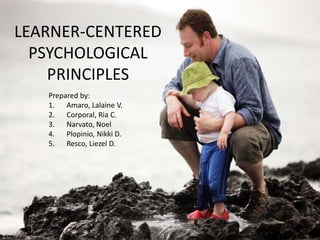
Learners centered psychological principle
- 1. LEARNER-CENTERED PSYCHOLOGICAL PRINCIPLES Prepared by: 1. Amaro, Lalaine V. 2. Corporal, Ria C. 3. Narvato, Noel 4. Plopinio, Nikki D. 5. Resco, Liezel D.
- 2. Background • Research in psychology relevant to education has been particularly informative. • Advances in our understanding of thinking, memory, and cognitive and motivational processes can contribute directly to improvements in teaching, learning, and the whole enterprise of schooling • educators concerned with the growing problems of school dropout, low levels of academic achievement, and other indicators of school failure are arguing for more learner- centered models of schooling
- 3. Background • The LC principles are consistent with more than a century of research on teaching and learning. • Learner-centered psychological principles provide a framework for developing and incorporating the components of new designs for schooling. • These principles emphasize the active and reflective nature of learning and learners
- 4. Background • Educational practice will be most likely to improve when the educational system is redesigned with the primary focus on the learner • LcP provides a framework that can contribute to current educational reform and school redesign efforts • The 14 psychological principles pertain to the learner and the learning process
- 5. Background • LCP focus on psychological factors that are primarily internal to and under the control of the learner rather than conditioned habits or physiological factors • LC principles also attempt to acknowledge external environment or contextual factors that interact with these internal factors
- 6. Background • Cognitive and Metacognitive Factors – (6 principles) • Motivational and Affective Factors – (3 principles) • Developmental and Social Factors – (2 principles) • Individual Differences Factors – (3 principles)
- 7. Cognitive and Metacognitive Factors • 1. Nature of the learning process. – The learning of complex subject matter is most effective when it is an intentional process of constructing meaning from information and experience. • 2. Goals of the learning process. – The successful learner, over time and with support and instructional guidance, can create meaningful, coherent representations of knowledge.
- 8. Cognitive and Metacognitive Factors • 3. Construction of knowledge. – The successful learner can link new information with existing knowledge in meaningful ways. • 4. Strategic thinking. – The successful learner can create and use a repertoire of thinking and reasoning strategies to achieve complex learning goals.
- 9. Cognitive and Metacognitive Factors • 5. Thinking about thinking. – Higher order strategies for selecting and monitoring mental operations facilitate creative and critical thinking. • 6. Context of learning. – Learning is influenced by environmental factors, including culture, technology, and instructional practices.
- 10. Motivational and Affective Factors • 7. Motivational and emotional influences on learning. – What and how much is learned is influenced by the motivation. Motivation to learn, in turn, is influenced by the individual's emotional states, beliefs, interests and goals, and habits of thinking. • 8. Intrinsic motivation to learn. – The learner's creativity, higher order thinking, and natural curiosity all contribute to motivation to learn. Intrinsic motivation is stimulated by tasks of optimal novelty and difficulty, relevant to personal interests, and providing for personal choice and control.
- 11. Motivational and Affective Factors • 9. Effects of motivation on effort. – Acquisition of complex knowledge and skills requires extended learner effort and guided practice. Without learners' motivation to learn, the willingness to exert this effort is unlikely without coercion.
- 12. Developmental and Social Factors • 10. Developmental influences on learning. – As individuals develop, there are different opportunities and constraints for learning. – Learning is most effective when differential development within and across physical, intellectual, emotional, and social domains is taken into account. • 11. Social influences on learning. – Learning is influenced by social interactions, interpersonal relations, and communication with others.
- 13. Individual Differences Factors • 12. Individual differences in learning. – Learners have different strategies, approaches, and capabilities for learning that are a function of prior experience and heredity. • 13. Learning and diversity. – Learning is most effective when differences in learners' linguistic, cultural, and social backgrounds are taken into account.
- 14. Individual Differences Factors • 14. Standards and assessment. – Setting appropriately high and challenging standards and assessing the learner as well as learning progress -- including diagnostic, process, and outcome assessment -- are integral parts of the learning process.
- 15. Thank You!
